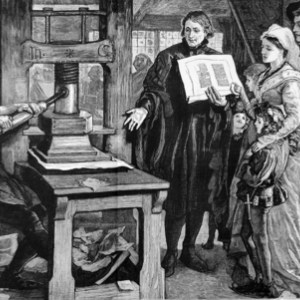Where do great writers come from? Did Ernest Hemingway suddenly appear to us as a best-selling author, like gray-eyed Athena from mighty Zeus’s head? Did John Steinbeck begin his career by landing a multimillion-dollar book deal with a publishing conglomerate?
Nope. These authors—and most of your favorites—got off to a more modest start. Hemingway’s first book was a collection of stories and poems with an initial run of 300 copies, and Steinbeck’s first novel had an initial run of 1,537 copies.
Achieving success as an author is like achieving success in any other field: you must work and fight and claw your way to greatness. Though some authors explode into popularity with their first published novels (E. L. James, Fifty Shades of Grey; Stephenie Meyer, Twilight; Stephen King, Carrie), this is far from the norm. Most authors have to start somewhere that isn’t a major publishing house. That somewhere is often a small press, which, like the author, is struggling to make a name for itself.
As a budding author, you want to get the best deal possible. When you’re an unknown quantity, the best deal you can get—or maybe the only deal—is most likely with a small press. Big publishing houses like Penguin Random House and Knopf Doubleday don’t often take chances on debut authors, even if their writing is amazing.
In 1989, a criminal attorney named John Grisham had just finished writing his first novel, A Time to Kill. After being rejected by dozens of publishers and literary agents, the novel finally found a home with Wynwood Press, a little-known publisher. Although A Time to Kill didn’t achieve much commercial success after its release, it set the stage for Grisham’s next novel, The Firm. Twenty-six books and nine film adaptations later, Grisham is one of the best-selling authors of all time—thanks in part to a small press that took a chance.
J. K. Rowling famously penned the first Harry Potter novel as a single mother on welfare. After many rejections from publishers, the boy wizard was finally published in 1997 by Bloomsbury Publishing, a small press at the time. In 1995, Bloomsbury reported sales of £11 million. In 2007, Bloomsbury reported more than £150 million in revenue, thanks in large part to the success of Harry Potter and the Deathly Hallows and the rest of the Harry Potter series. In this case, the author and publishing house reached great heights together.
Ooligan Press is based in Portland, Oregon, so we might as well include a local success story. In 2007, Monica Drake published her debut novel Clown Girl with Hawthorne Books, a small Portland-based press. Three years later, SNL alum Kristen Wiig optioned the film rights. And in 2013, Drake published her second novel The Stud Book with Hogarth, an imprint of Penguin Random House.
Philip Pullman, Margaret Atwood, Janet Evanovich, Agatha Christie: The list of famous authors who debuted with small presses is long and impressive. Most of those who didn’t publish their first books with small presses built up their literary reputations by writing short stories, news stories, poems, articles, etc. And virtually every author—including all of those mentioned above—has endured the sting of rejection many times over.
The point is, publishing with a small press isn’t “settling”; it’s a great and often necessary first step for a new author. Though there’s always a chance that a Big Five publishing house will take your manuscript and run with it, it’s far more likely that your debut novel will be published by a small press.

